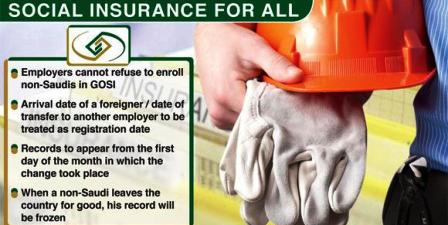
Riyadh, May 13: Expatriate workers can now become beneficiaries of the General Organization For Social Insurance (GOSI) under a new scheme introduced by the Ministry of Labor.
The announcement followed a meeting held late Saturday between the officials of the Labor Ministry and the representatives of various foreign missions at the Ritz Carlton Hotel in Riyadh.
The Ministry of Labor had summoned all the heads of foreign missions and labor counselors of the embassies and their consulates to brief them of the latest labor regulations and the conditions of amnesty declared by the government on Friday.
Hosting the meeting on behalf of Labor Minister Adel Fakeih, his deputy minister, Moufarrej bin Saad Al-Hagbani, held a wide range of talks on labor issues with the foreign diplomats.
The deputy minister explained that the GOSI would register the names of the expatriates effective today if they were not registered earlier under the insurance scheme.
GOSI is compulsory for all Saudis and was previously optional for expatriates. However, until today, private companies could refuse to enroll their expat workers in GOSI. The new scheme allows expats to register for GOSI and their private employers cannot refuse them.
Sulaiman Al-Quwaiz, governor of GOSI, told Asharq Al-Awsat that the date on which a non-Saudi worker comes to Saudi Arabia, or the date on which his service is transferred to another employer, will be the date he is registered with the professional hazards division of GOSI. The records will appear from the first date of the month on which the change took place.
“But when a non-Saudi subscriber leaves the country for good, or when his services are transferred to another employer, his record will be frozen,” he said.
Al-Quwaiz said the subscriber starts earning the benefits effective immediately from his registration. Benefits include full medical coverage.
Meanwhile, foreign diplomats expressed concern over the limited grace period during which expats have to legalize their status. The grace period ends on July 3.
Envoys said the amnesty period is too short. They also wanted details on the mechanism of the implementation.
Saudi officials assured the envoys the ministries would work around the clock if necessary to expedite the process to meet the deadline, but ruled out any extension of the grace period, according to diplomats who attended the closed-door meeting.
Some diplomats asked for the designation of Saudi officials for specific issues in the passport and labor offices to speed up the process.
In cases in which departing candidates do not have their original passports, foreign diplomatic missions may issue travel documents that may be processed at the Passport offices so that they are free to travel, according to Saudi authorities.
Speaking about Nitaqat and the amnesty provided by the government, Al-Hagbani said illegal expatriates after the grace period would face a penalty of SR 100,000 and a jail term of two years.
“The whole idea of the program is to ensure a healthy work environment in the Kingdom free of illegal stayers,” the deputy minister said. He added the government wants to have quality workers. It is the wish of the government, he said, to ensure that every foreign worker is properly documented.
Pakistan Ambassador Muhammed Naeem Khan said the new provision for the GOSI insurance is a relief for foreign workers. He recalled a recent road accident, where some Pakistanis died and the sponsor could not pay compensation for the deceased workers. The new scheme would provide some relief to the relatives of the people who die in such circumstances.
Describing the meeting as excellent, deputy chief of the Indian Embassy Sibi George said the meeting was useful for all labor-exporting countries. “We were able to get the right advice on some of the problems that the missions were facing during the implementation of the program,” George said.
The diplomat said his mission was able to get 10,000 passports of its nationals ready with the help of the immigration department.
Bangladesh Ambassador Shahidul Islam said the envoys got an ideal platform to clarify a wide range of issues. He also took the opportunity to thank the Saudi leadership, which allowed the transfer of sponsorship of Bangladeshis. “It is great news for the community and the affected expatriates now can rectify their visa status without any problems,” he said.
Islam said his embassy in Riyadh and the consulate general in Jeddah will organize camps at various places around Saudi Arabia to provide emergency consular services to Bangladeshis. “We are taking consular services to their doorstep to help them benefit from the services without having to travel to the distant missions of their country,” he said.
Sri Lankan Labor Counselor Anura Muthumala said his mission has started the implementation of the program to beat the deadline before the end of the grace period. He said that his mission will have mobile consular services in places such as Dammam, Hail, Al-Qassim and Saqaka to reach out to his countrymen.






Comments
Add new comment